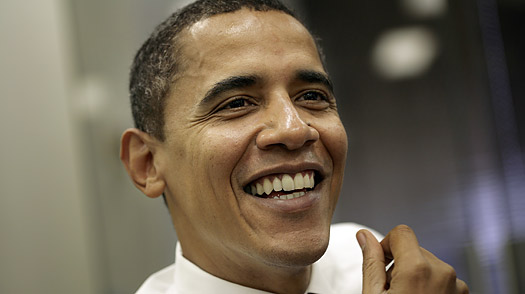
(3 of 6)
His official theme was change, but a specific kind of change: the nuts-and-bolts kind you can see and measure. Voters were invited to believe because Obama kept delivering the goods. Certainly he made mistakes and gave up on some ideas while doubling back on others — his promise to stick to the existing campaign-finance system, for example. On the whole, though, he was a doer. Obama told people that a black man could win white votes. In Iowa he proved it. He said a broad-gauge campaign could win in GOP strongholds; along came Indiana and Virginia and North Carolina. He declared that a new approach to politics would topple the old Clinton-Bush seesaw, and topple it he did. He sank the three-pointer with the cameras rolling. Made a speech in a football stadium feel intimate. Some might say these are not exactly Churchillian achievements, but in the land of the hapless, the competent man is king. In the end, his campaign e-mail list numbered some 13 million people, of whom more than 3.5 million put actual skin in the game — money, volunteer hours or both. Obama's most formidable opponent, Hillary Clinton, tried to convince voters that he was all talk and no action, a vessel empty but for intoxicating fumes. Yet he was the one whose campaign ran like clockwork, while hers was a fratricidal mess. And by Nov. 4, the strongest party in the U.S. was no longer the Republican Party or the Democratic Party; it was the Obama Party.
II. Filling the Vacuum
"A presidential campaign is like an MRI of the soul," says David Axelrod, Obama's chief strategist. "And one of the great revelations of this process, certainly the most thrilling revelation to me, was to learn what a great manager this guy is. We had no way of knowing that when we started. When he decided to run, we had no political infrastructure at all. There was just a handful of us, and we were setting off to challenge the greatest political operation in the Democratic Party."
Keep in mind that Obama, as Rudy Giuliani put it at the Republican Convention in September, had "never led anything, nothing, nada" — certainly not a sprawling organization spread from coast to coast. But he did have a philosophy of leadership, which he explains like this: "I don't think there's some magic trick here. I think I've got a good nose for talent, so I hire really good people. And I've got a pretty healthy ego, so I'm not scared of hiring the smartest people, even when they're smarter than me. And I have a low tolerance of nonsense and turf battles and game-playing, and I send that message very clearly. And so over time, I think, people start trusting each other, and they stay focused on mission, as opposed to personal ambition or grievance. If you've got really smart people who are all focused on the same mission, then usually you can get some things done."
Stop and look back at those last few words, because they are a telltale sign of Obama's pragmatism. A persistent question during the campaign — it became the heart of John McCain's message in the closing weeks — was whether Obama was some kind of radical, a terrorist-befriending socialist masquerading as Steady Freddy. As he builds his Administration, though, he is emerging as a leader who just wants to "get some things done." (Read "The New Liberal Order.")
Obama is a businesslike boss. He prefers briefing papers tightly written and shows up for meetings fully prepared. He expects people to challenge him when they think he is wrong and to back up their ideas with facts. He's not a shouter — "Hollering at people isn't usually that effective," he explains — but if he thinks you've let him down, you'll know it. "What was always effective with me as a kid — and Michelle and I find it effective with our kids — is just making people feel really guilty," he says. "Like 'Boy, I am disappointed in you. I expected so much more.' And I think people generally want to do the right thing, and if you're clear to them about what that right thing is, and if they see you doing the right thing, then that gives you some leverage."
Again, take a second to reread, this time the bit where he says "people generally want to do the right thing." Trust of this kind has been in short supply for many years in American politics, where the dominant attitude is that every disagreement is a sign of bad faith and every opponent is assumed to be malevolent. Obama's attitude was ridiculed as kumbaya naiveté during the campaign, but trust proved to be essential to his victory. His campaign entrusted millions of volunteers with unprecedented authority to download information about prospective voters, to assign themselves to make phone calls and canvass their own neighborhoods and apartment buildings, and to keep the campaign abreast of their progress. A typical presidential effort is top-down, intensely protective of its data and strategies. Obama's approach seemed to court mischief or even chaos. "There was a lot of snickering among the political pros," says Plouffe. "They couldn't believe that we were giving people we didn't know access to our data and trusting them to handle it honestly. But it was enormously important because it made people feel that much more accountable: 'These are my three blocks, and everyone's counting on me.'"